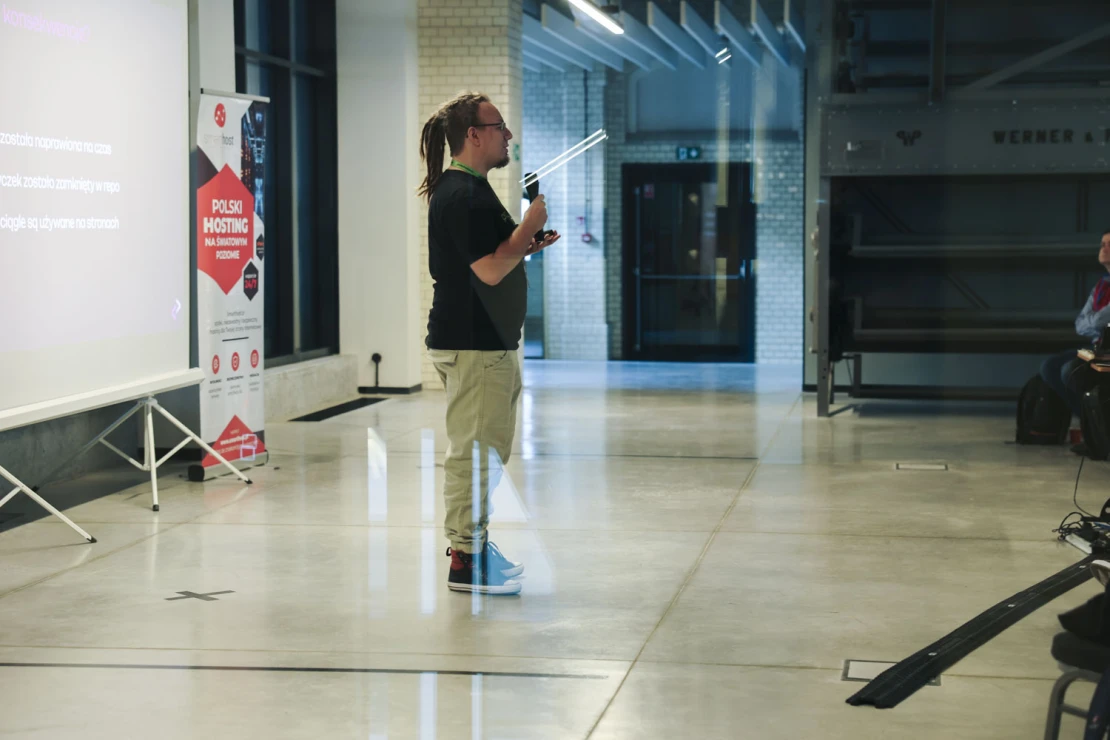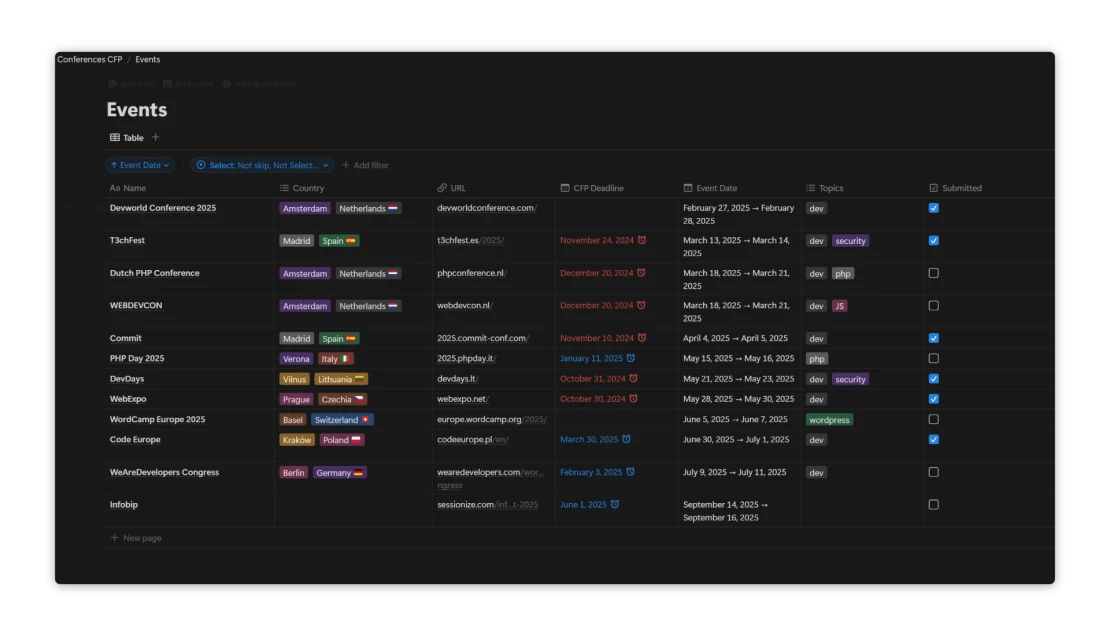A Practical Guide to Finding Speaking Opportunities

This year was successful for me in terms of speaking at conferences. In general, I spoke at 13 conferences (online and offline). This is my personal best, but it didn't happen because of dumb luck - there was a lot of work behind it.
On the other hand, I know that many people struggle to take the first step in public speaking. That's why I decided to share my experience and the tools I use to prepare for conferences.
Topics
I create a maximum of 3 new topics every year and update the old ones I use.
When I have the topics, I create everything around them:
description
what listeners will learn from it
bullet points about what I want to put inside
And remember - this part is crucial. Make sure that the topic and description are interesting and without typos. Use tools like Grammarly or ChatGPT to make sure it's all top-notch. Also, ask others for opinions about the topic and description.
What's important - don't prepare your talks right away. If a topic isn't ever picked, there is no sense in building a deck.
Is it time to search for conferences? Not yet.
Prepare all the stuff about yourself.
Another important aspect is you. Again, it's important to prepare interesting things about yourself. So make sure you have a:
bio - prepare a few variants, shorter and longer + written in 1st and 3rd person. Sometimes it's a good idea to ask someone else to help write this part.
list of conferences where you spoke with some links where people can watch you speak.
links to your social media and your websites. Of course, make sure they are active and up-to-date.
a nice photo of yourself - but please, don't use a photo that you took 20 years ago.
The cool part about this is that you create it once and just update it once in a while.

Where to look?
There are a few websites that aggregate conferences and those are the best places to start looking.
Here are my favorites:
Sessionize - it's my favorite place not only to find conferences but also to submit your talk proposals. Also, when you fill out your profile there is a Discover tab, where you can find some events
Developers Events - it's an amazing place to find events and you can easily filter them
See CFP - a rather good place to look for events - everything is stored in an Airtable, so you can filter the events you are interested in
Many frameworks or CMSs have a website listing events like WordCamp Central if you are into WordPress.
Also, it's a good idea to ask on social media about conferences worth speaking at. You may find many interesting opportunities that way. I do this twice a year and I discovered quite a few interesting events this way.
How to organize it all?
Organizing it all it's one of the most difficult parts. Why? You need to remember all the dates, when is the CFP deadline, when is the event, and if events overlap each other.
To keep everything in order, I use Notion. I have a database with events, dates, and statuses (did I submit a talk already, skip an event, etc.). The cool part about Notion is that I can switch from a table view to a calendar view, which is very useful for learning if conferences are overlapping. I also use reminders—they are very useful for reminding me about CFP deadlines.

My CFP Notion
I try to add every possible conference that fits my profile and then I start filtering out some of them:
I remove the ones that happen during family vacations, holidays, etc.
Next, I check for how easy it is to get there - if I feel that traveling there is too difficult, I skip such a conference.
I prefer conferences where travel and stay costs are covered. It's not a dealbreaker, but such a conference must be really interesting.
If I see too many events happening during one month, I try to filter some of them out.
When I get accepted to an event - I check if it doesn't overlap with others. If it does, I will remove the other ones.
In short, add as much as possible to your shortlist and filter out as much and as early as possible.
Few loose tips
First of all - it's better to submit more talks and later back off from speaking, rather than submit your talk to just one or two conferences. Overall, it's a numbers game. You need to do everything to bump your chances.
Make sure to see how people react to your talk - if you see that something is off, maybe it's a good idea to change something. Some of my presentations went through 8 versions of updates.
Remember that while amazing, conferences and traveling drain a lot of energy. So, please don't overdo it. Also, make sure the travel part is as simple as possible.
Never miss a speaker dinner—and I'm not just talking about missing free food—those are an amazing chance to meet other people better.
If you feel that talking in front of a bigger audience is too stressful for you, start with smaller meetups or online conferences. It's a great way to practice, try out your topic, and gain experience. Thanks to smaller events you'll feel much more comfortable speaking in front of a bigger crowd.
Make sure to bring company swag to the event and later report if the event is worth sponsoring next year. Overall make sure that the company you work at benefits a bit from your travels too. I always try to give away stickers, have a Patchstack t-shirt do a bit of guerilla marketing for my company (it's easy to find people frustrated about WordPress' security at any conference).
Let's sum up
Speaking at conferences is an amazing experience. It allows you to share your knowledge with others (which is my favorite part). This can open some interesting opportunities - from a side gig or collaboration to finding a new, better job.
Also, when you're a speaker you get a chance to participate in the event and learn a lot from other people.
Good luck in finding your dream public speaking opportunities. And don't forget to share your tips.
Get updated about new blog posts
No spam